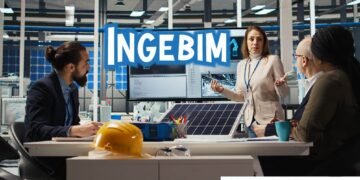Introduction
In today’s manufacturing world, speed, accuracy, and sustainability define success. Repmold emerges as a transformative mold-making innovation that blends digital design, automation, and eco-conscious engineering into a single, powerful framework. From automotive to aerospace, and from consumer goods to medical devices, Repmold has redefined how industries conceptualize precision manufacturing. It eliminates long lead times, minimizes waste, and ensures that every mold delivers exceptional repeatability and performance. Unlike traditional systems, Repmold integrates computer-aided design (CAD), computer numerical control (CNC), and additive manufacturing to achieve results once thought impossible. This technology has evolved alongside the rise of Industry 4.0, connecting real-time data, simulation, and sustainability goals into one streamlined workflow. In this article, we will explore the origins, functionality, technologies, advantages, challenges, and future of Repmold, offering a complete guide for businesses eager to embrace smarter, cleaner, and faster mold production.
What Is Repmold and How It Works
The Core Definition
Repmold is an advanced, precision-focused mold-making system that integrates CAD modeling, CNC machining, and additive manufacturing for unmatched production efficiency. It operates as a hybrid platform combining traditional craftsmanship with modern digital simulation, allowing manufacturers to create complex geometries faster and with superior accuracy. Repmold dramatically reduces lead times, enhances consistency, and supports rapid prototyping cycles by linking design software with automated machining and 3D printing. The seamless coordination among these technologies ensures that manufacturers achieve high-quality results with minimal defects and waste. Its adaptability means it can produce molds for a vast range of materials—from metals to polymers—while maintaining micro-level precision. As industries shift toward digital manufacturing ecosystems, Repmold bridges the gap between engineering design and production reality, driving innovation in every sector it touches.
The Repmold Process Step-by-Step
The Repmold process begins with an advanced design phase, where engineers use CAD and simulation tools to model the mold geometry and test performance parameters virtually. Once the design is validated, material selection follows, emphasizing high-strength aluminum, steel, or composite alloys chosen for durability and cooling efficiency. The manufacturing phase then incorporates 3D printing, CNC machining, and laser finishing to produce intricate, accurate molds. Afterward, a testing and validation stage ensures that the mold meets all requirements for flow control, thermal balance, and mechanical stability using simulation-based digital twins. Finally, the production launch integrates the mold into large-scale manufacturing systems—ranging from plastic injection to metal casting—enabling consistent, high-quality outputs across different product categories. This streamlined, data-driven workflow not only accelerates production but also guarantees precision and reliability in every cycle.
The Evolution of Repmold Technology
From Hand-Crafted Molds to Digital Precision
The journey toward Repmold began centuries ago when molds were sculpted by hand with rudimentary tools. During the Industrial Revolution, mechanized machinery introduced higher consistency and productivity, but limitations in flexibility persisted. By the mid-20th century, CNC machining and CAD software transformed mold-making into a science, giving rise to precise and repeatable processes. The introduction of automation in the late 20th century paved the way for faster, error-free fabrication. Over decades, continuous experimentation with digital integration, robotics, and data feedback culminated in Repmold—a system designed to merge craftsmanship and computation. This technology now stands as a symbol of industrial evolution, representing how centuries of progress have been condensed into a single intelligent mold-making ecosystem.
Breakthrough Moment — The Rise of Smart Manufacturing
With the dawn of Industry 4.0, Internet of Things (IoT) connectivity, and machine learning, Repmold reached its defining moment. Factories became “smart,” equipped with sensors that deliver real-time feedback to design systems. Through predictive analytics, engineers could preempt defects, control temperature variations, and optimize material flow. This synergy of hardware and data gave Repmold the power to adapt instantly to production demands. Today, it forms the backbone of smart factories worldwide, merging automation with continuous learning and predictive maintenance—making Repmold the hallmark of modern manufacturing precision.
Key Technologies Powering Repmold
| Technology | Function | Advantage |
|---|---|---|
| CAD & CAM Systems | Digital design and automated production | Ensures precise modeling and faster cycle times |
| 3D Printing / Additive Manufacturing | Rapid prototyping and mold inserts | Enables complex geometries with reduced cost |
| CNC Machining | Precision cutting and shaping | Maintains high tolerance and surface integrity |
| Simulation & Digital Twin | Predicts mold behavior and heat flow | Minimizes risk, waste, and rework |
| AI & Machine Learning | Data-based optimization of parameters | Enhances performance and energy efficiency |
Each of these technologies plays a crucial role in shaping the Repmold ecosystem, ensuring continuous innovation and adaptability in competitive industrial environments.
Applications of Repmold Across Industries
Automotive Manufacturing
In the automotive sector, Repmold is used for precision molds that shape engine housings, dashboards, lighting units, and high-strength plastic trims. Manufacturers benefit from rapid iteration cycles that reduce vehicle development time while maintaining structural consistency and safety compliance.
Aerospace & Defense
The aerospace industry leverages Repmold to produce lightweight, high-durability components using advanced composite materials. Its precision under extreme tolerances ensures flawless integration of aircraft parts, improving both efficiency and flight safety.
Medical Devices & Healthcare
In healthcare, Repmold facilitates the creation of intricate molds for surgical instruments, implants, and diagnostic tools. Cleanroom-grade precision guarantees safety, sterility, and performance—essential in medical manufacturing.
Consumer Electronics
For electronics, Repmold enables the production of micro molds for smartphone casings, connectors, and semiconductor housings. Its high fidelity supports miniaturization while ensuring sleek aesthetics and reliability.
Packaging and Consumer Goods
Repmold’s eco-adaptive molds allow the packaging industry to produce biodegradable containers and sustainable plastics at scale. This innovation reduces waste and supports the growing demand for green consumer goods.
Sustainability and Eco-Friendly Practices
Reducing Material Waste
Repmold minimizes waste through precise simulation-driven material flow and digital optimization. Every design iteration undergoes testing before production, cutting down on defective batches and scrap materials.
Energy Efficiency
Advanced cooling channels, efficient thermal regulation, and closed-loop systems make Repmold remarkably energy-efficient. Heat recycling and smart sensors ensure reduced power consumption during every production run.
Circular Manufacturing
Repmold molds are engineered for longevity, easy maintenance, and recyclability. Their designs promote reusability and refurbishment, aligning with the circular economy model that emphasizes sustainability and minimal environmental impact.
Advantages of Repmold Technology
Repmold delivers unmatched advantages across multiple parameters. Its speed allows manufacturers to cut production times drastically through digital automation. The precision achieved—often within micrometer tolerances—ensures uniform quality across large production runs. Flexibility enables Repmold to adapt to a range of materials, from metals to eco-friendly polymers. Its cost-efficiency reduces material waste and labor dependency, improving overall profitability. Moreover, Repmold supports sustainability with green manufacturing principles, minimizing energy use and carbon emissions. Its scalability allows both small prototype shops and large factories to operate with the same technology base, ensuring consistent growth and innovation potential.
Challenges and Considerations
High Initial Investment
While Repmold offers long-term savings, the initial investment in machinery, software, and training can be significant. This barrier often limits access for smaller firms.
Material and Compatibility Issues
Not all materials are suited for high-speed digital molding processes. Continuous research is needed to expand Repmold’s compatibility with new alloys and composites.
Skill Gap and Training Needs Repmold
Adopting Repmold requires skilled professionals who understand CAD/CAM workflows, data analytics, and automation control. Upskilling the workforce is essential for maximizing efficiency.
Maintenance and Quality Control Repmold
Because Repmold depends heavily on precision, constant calibration, monitoring, and testing are vital to ensure safety, performance, and consistency.
Cultural and Industrial Significance
Repmold is more than a technology—it’s a cultural shift in manufacturing philosophy. It revives craftsmanship in a digital age by empowering engineers to function as modern artisans. The integration of automation and artistry fosters creativity, innovation, and sustainability. Economically, Repmold fuels productivity, job creation, and global competitiveness. Culturally, it symbolizes how industries can merge precision engineering with environmental responsibility, redefining excellence in the manufacturing landscape.
The Future of Repmold
Integration with AI and Predictive Design
Artificial intelligence will allow Repmold to self-optimize mold geometry, cooling flow, and stress distribution automatically, improving output and consistency.
Global Expansion Repmold
Emerging markets are rapidly adopting it, aiming for localized, high-efficiency production. This expansion strengthens global manufacturing independence.
Towards Full Sustainability
Future Repmold systems will integrate biodegradable materials, solar-powered production, and carbon-neutral processes to meet global climate goals.
The Vision for Industry 5.0 Repmold
The next evolution—Industry 5.0—will combine human creativity with machine precision. it will anchor this movement, merging emotional intelligence with technological accuracy.
Getting Started with Repmold — A Practical Guide
-
Assess Needs: Evaluate production goals and quality standards.
-
Invest in Tools: Begin with CAD/CAM software and small-scale prototyping systems.
-
Collaborate with Experts: Partner with digital manufacturing specialists for integration support.
-
Train Your Team: Encourage upskilling in automation and simulation technologies.
-
Scale Strategically: Start with prototypes and expand gradually to full automation.
Conclusion
Repmold stands as a defining force in the evolution of modern manufacturing—merging speed, precision, and sustainability into a unified process. Its combination of automation, data intelligence, and eco-awareness has turned mold-making into a cornerstone of smart manufacturing. By reducing waste, enhancing design agility, and enabling real-time optimization, it bridges the gap between innovation and responsibility. As industries across the globe embrace digital transformation, it leads the charge toward a more efficient, adaptive, and sustainable industrial future. It is not just a tool—it’s the foundation of a new era where creativity, technology, and environmental consciousness coexist in perfect balance.
(FAQs)
1. What makes it different from traditional mold-making?
Repmold uses automation, digital design, and 3D printing to deliver faster, more precise, and sustainable results.
2. Is Repmold suitable for small manufacturers?
Yes, smaller setups can adopt scaled-down versions, though initial setup and training may require investment.
3. How does it promote sustainability?
By minimizing waste, optimizing energy use, and employing recyclable or biodegradable materials in production.
4. Which industries benefit most from it?
Automotive, aerospace, packaging, consumer electronics, and medical manufacturing lead in adoption.
5. What does the future hold for Repmold?
Integration with AI, advanced sensors, and eco-manufacturing will make it central to Industry 5.0 innovation.
More Article Links :
Pasonet: Unified Platform for Schools & Businesses


















Discussion about this post